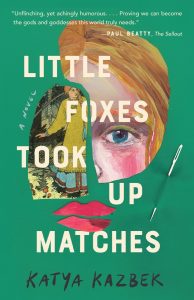Reviewed by Cassie Montgomery

Mitya’s family has been expecting his death ever since he swallowed a sewing needle when he was two. As he grows, Mitya views the world as someone who should have died long ago: with a wonder and optimism that doesn’t quite fit into his home of Moscow during the collapse of the Soviet Union. All his life, Mitya’s gentleness has been loved by some and punished by others, and he is never quite sure where he fits in– with the boys, with the girls, or somewhere in between. Over the course of a few years, Mitya does more than anyone would expect a child with a timebomb in his body to accomplish, and he does so through an almost idyllic belief of protection from the very sewing needle destined to cause his death. Told through alternating stories of Mitya’s violent and intense early childhood and extravagant scenes from a Russian folktale, Little Foxes Took Up Matches is a beautiful exploration of gender identity, sexual abuse, and the corruption of a declining government.
While Katya Kazbek established herself in the writing world by co-founding and editing the online publication Supamodu, this semi-surreal bildungsroman is her debut novel. However, Little Foxes Took Up Matches in no way feels inexperienced. Kazbek writes with all the gravitas and unexpected humor that Mitya’s complex and ongoing coming-of-age requires. Kazbek’s novel reads not only as a recount of a child’s formative years through great times of hardship, but also as a discovery of self: how trauma and kindness can forge a person to reveal who they are underneath superficial outward appearances. Identities and experience of gender, sexuality, education, and righteousness are malleable and ever changing, and Mitya’s interactions with the world and people around him work constantly to help him find out who he is. Or at least, pushes him in that direction. Little Foxes Took Up Matches craftily blends a realistic fiction coming-of-age with a magical fantasy that feels fresh off the pages of a storybook. Expect tears of joy and anguish, bursts of outrage, and desperate hopefulness as Kazbek pulls you through the winding streets of Moscow.
As I read this novel for the first time, the charming and oftentimes remarkable retold tales of the Russian myth, Koschei the Deathless, interspersed into the main story created a wondrous sort of escapism from the harsh, bitter cold of Mitya’s family and neighborhood. These fantastical chapters pleasantly play with form and reader expectations of a traditional novel. They collect the readers around a campfire to recount the gripping tales of Koschei, often mirroring aspects of Mitya’s life experiences of loyalty, betrayal, loss, and belonging in an unconventional way. What stood out the most to me, however, was Kazbek’s characterization and ability to turn traditional archetypes– the strict and heavy-handed father, the misplaced young woman looking for a better life, the corrupt law enforcement– into their own, unpredictable interpretations. I found myself drawn to the drastic contrast of personalities, between Mitya’s longing for justice in a corrupt society and home of violence, his war-scarred and abusive cousin Vovka, and his accepting and pure-hearted friends Marina and Valerka. Told through a roaming third person point of view, I got a broader idea of the side characters’ motivations and environment that revealed harsher truths about the world that Mitya does not often see. I found myself desperately wanting to reach in and scream at him that life is not as kind as he wants it to be, but some lessons he must learn on his own. Kazbek’s novel was an intense and page-turning read– a promise that each word is more gripping than the last.
What makes us different? Who decides how we present ourselves to the world? Little Foxes Took Up Matches explores the bumpy and frightening path that children, and even some adults, follow to find their veritable place of belonging. Kazbek’s prose pulls on heartstrings and funny bones– mixing humor, joy, and sorrow into this modern fable.
